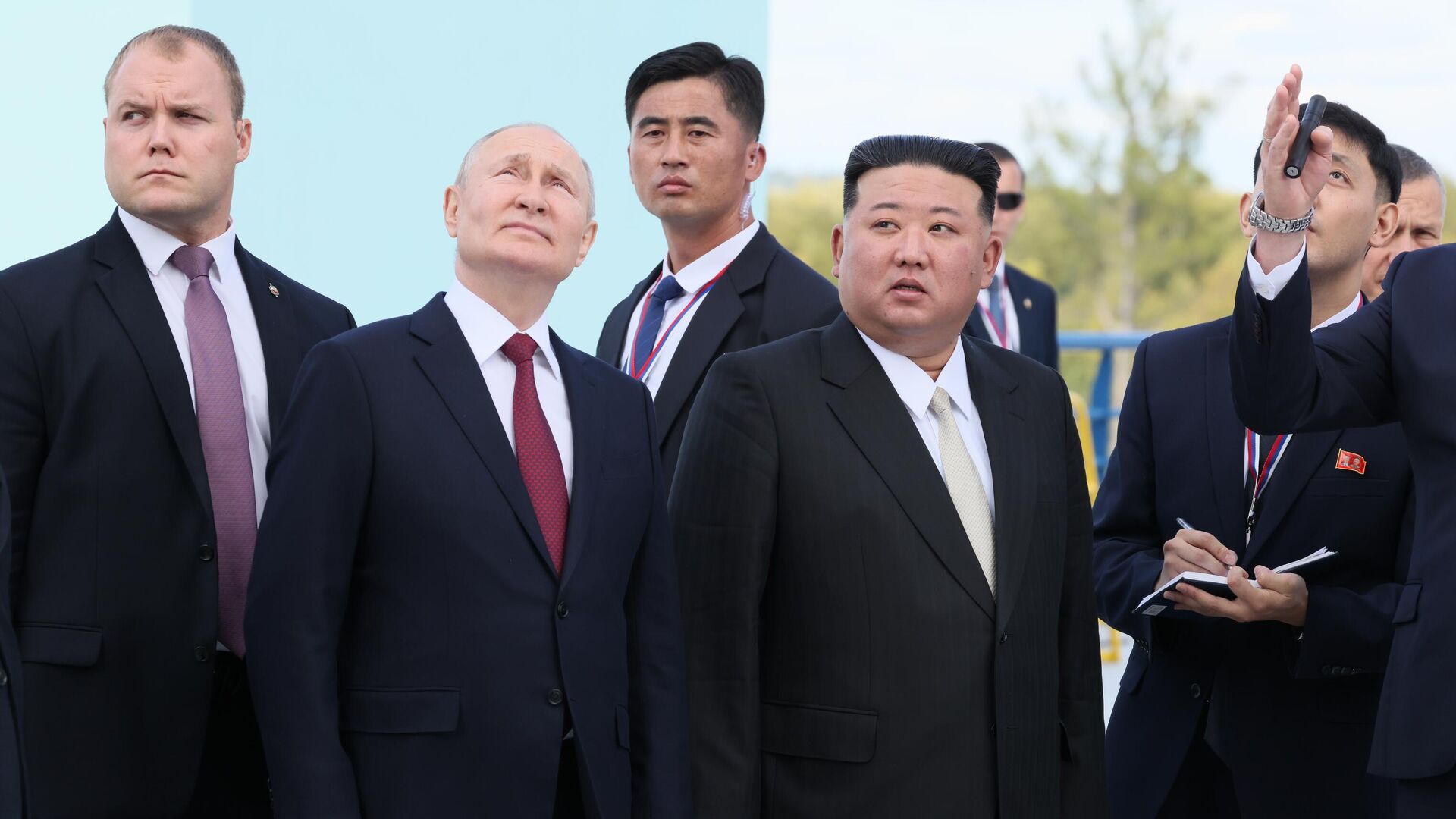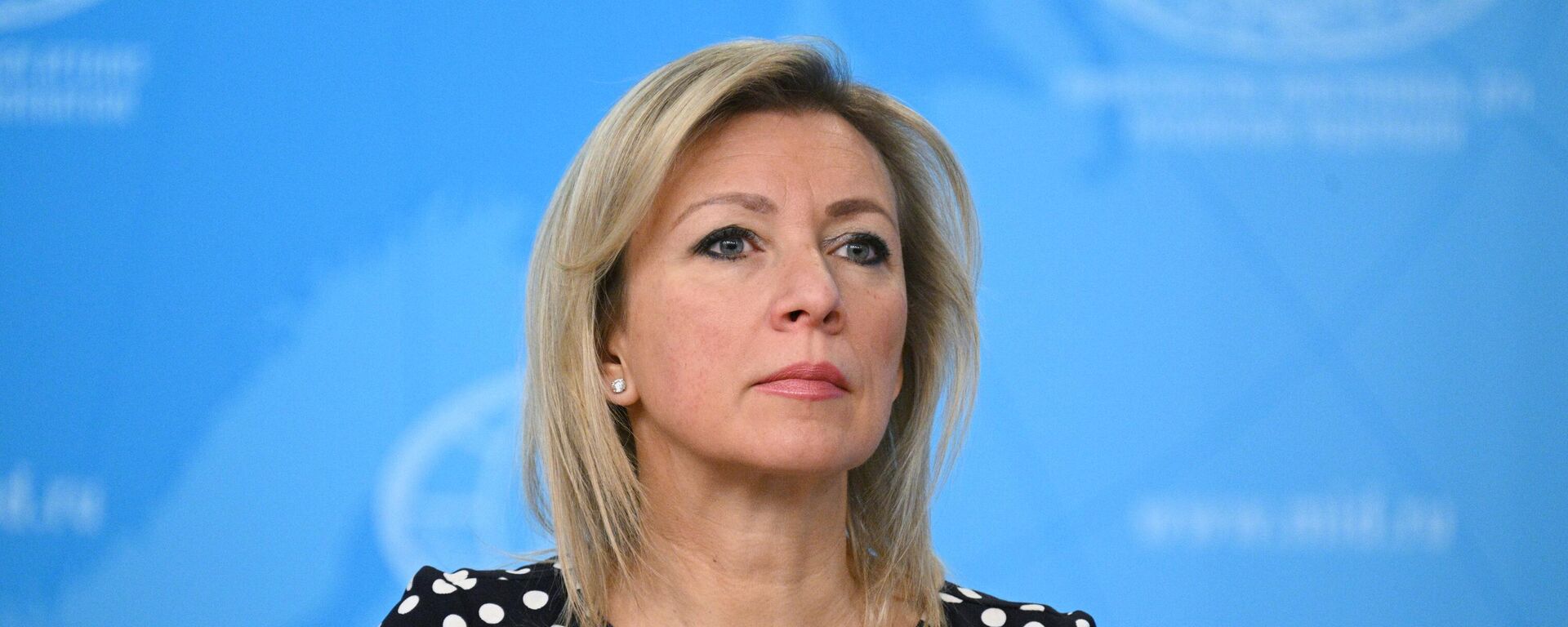https://sputnikglobe.com/20240405/strengthened-russia-dprk-relations-signal-new-world-beyond-us-hegemony-1117771381.html
Strengthened Russia-DPRK Relations Signal New World Beyond US Hegemony
Strengthened Russia-DPRK Relations Signal New World Beyond US Hegemony
Sputnik International
The two countries’ cooperation is yet another sign of an emerging multipolar world order, says one analyst.
2024-04-05T22:08+0000
2024-04-05T22:08+0000
2024-04-06T09:25+0000
analysis
scott ritter
garland nixon
joe biden
north korea
russia
china
the united nations (un)
https://cdn1.img.sputnikglobe.com/img/07e7/09/0d/1113340870_0:0:3046:1714_1920x0_80_0_0_7afe9e94e71b6afd31685f575d848ddc.jpg
Russia and North Korea will develop mutually beneficial cooperation that will not be subject to illegal pressure from the West, Russian Foreign Minister Sergei Lavrov said last September. During his visit to Pyongyang in October, Lavrov and his North Korean counterpart decided to intensify cooperation, particularly in turnover volume. The foreign ministers also exchanged views on the situation on the Korean peninsula and in Northeast Asia and reaffirmed their determination to resist the hegemonic aspirations of the United States in the Asia-Pacific region. Last fall, Russian President Vladimir Putin and North Korean leader Kim Jong Un met at the Vostochny cosmodrome to discuss possible joint space projects, options for cooperation in the space sector, namely in satellite construction. Korean state media reported that Putin and Kim Jong Un "outlined points of further cooperation to jointly protect sovereignty and develop interests of both countries, regional and global peace and security, and international justice."“The Biden administration is starting to come to grips with the fact that the rules-based international order that they had been using to control what was a singularity, the American hegemony, is collapsing around them,” said former UN weapons inspector Scott Ritter this week, claiming the enhanced relations between the two countries are yet another sign of an emerging multipolar world order. Ritter appeared on Sputnik's The Critical Hour program to discuss the development with host Garland Nixon.“This goes beyond simply bilateral relations between Russia and North Korea,” said the former US Marine Corps intelligence officer. “Russia together with China, they're putting down a marker that says that which was normal in the past is no longer normal today. That the rules-based international order that was used to constrain North Korea, to punish North Korea, to weaken North Korea is not a viable system and that Russia is not going to play that game anymore.”Ritter claimed one indication of this new reality is Russia’s refusal to help enforce economic pressure against the DPRK. Moscow recently vetoed an extension of a UN enforcement body set up to monitor Pyongyang’s compliance with US-backed sanctions.Russian UN ambassador Vassily Nebenzia criticized the mechanism at the time, claiming it was subject to US political pressure. “Its work is increasingly being reduced to playing into the hands of Western approaches, reprinting biased information and analyzing newspaper headlines and poor quality photos,” said Nebenzia.Member states could still pursue individual efforts to enforce the sanctions, said Ritter, but such action could be more easily blocked, leading to “the death of sanctions.”“This represents the end of North Korea's isolation,” the expert concluded.
https://sputnikglobe.com/20240402/kim-jong-un-guides-test-fire-of-north-korean-hypersonic-ballistic-missile-1117707588.html
https://sputnikglobe.com/20240331/moscow-says-activities-of-un-group-of-experts-on-north-korea-not-impartial-1117665542.html
north korea
russia
china
Sputnik International
feedback@sputniknews.com
+74956456601
MIA „Rossiya Segodnya“
2024
John Miles
https://cdn1.img.sputnikglobe.com/img/07e8/01/19/1116388787_0:0:1316:1316_100x100_80_0_0_77e70d36afd983012b1c5d38ddb84156.jpg
John Miles
https://cdn1.img.sputnikglobe.com/img/07e8/01/19/1116388787_0:0:1316:1316_100x100_80_0_0_77e70d36afd983012b1c5d38ddb84156.jpg
News
en_EN
Sputnik International
feedback@sputniknews.com
+74956456601
MIA „Rossiya Segodnya“
Sputnik International
feedback@sputniknews.com
+74956456601
MIA „Rossiya Segodnya“
John Miles
https://cdn1.img.sputnikglobe.com/img/07e8/01/19/1116388787_0:0:1316:1316_100x100_80_0_0_77e70d36afd983012b1c5d38ddb84156.jpg
russia dprk relations, russia north korea relations, moscow pyongyang, russia north korea, russia north korea un sanctions, russia north korea cooperation
russia dprk relations, russia north korea relations, moscow pyongyang, russia north korea, russia north korea un sanctions, russia north korea cooperation
Strengthened Russia-DPRK Relations Signal New World Beyond US Hegemony
22:08 GMT 05.04.2024 (Updated: 09:25 GMT 06.04.2024) The two countries’ cooperation is yet another sign of an emerging multipolar world order, says one analyst.
Russia and North Korea will develop mutually beneficial cooperation that will not be subject to illegal pressure from the West, Russian Foreign Minister Sergei Lavrov said last September.
During his visit to Pyongyang in October, Lavrov and his North Korean counterpart decided to intensify cooperation, particularly in turnover volume. The foreign ministers also exchanged views on the situation on the Korean peninsula and in Northeast Asia and reaffirmed their determination to resist the hegemonic aspirations of the United States in the Asia-Pacific region.
Last fall, Russian President Vladimir Putin and North Korean leader Kim Jong Un met at the Vostochny cosmodrome to discuss possible joint space projects, options for cooperation in the space sector, namely in satellite construction. Korean state media reported that Putin and Kim Jong Un "outlined points of further cooperation to jointly protect sovereignty and develop interests of both countries, regional and global peace and security, and international justice."
“The Biden administration is starting to come to grips with the fact that the
rules-based international order that they had been using to control what was a singularity, the American hegemony, is collapsing around them,” said former UN weapons inspector Scott Ritter this week, claiming the enhanced relations between the two countries are yet another sign of an emerging multipolar world order. Ritter appeared on
Sputnik's The Critical Hour program to discuss the development with host Garland Nixon.
“This goes beyond simply bilateral relations between Russia and North Korea,” said the former US Marine Corps intelligence officer. “Russia together with China, they're putting down a marker that says that which was normal in the past is no longer normal today. That the rules-based international order that was used to constrain North Korea, to punish North Korea, to weaken North Korea is not a viable system and that Russia is not going to play that game anymore.”
Ritter claimed one indication of this new reality is Russia’s refusal to help enforce economic pressure against the DPRK. Moscow recently
vetoed an extension of a UN enforcement body set up to monitor Pyongyang’s compliance with US-backed sanctions.
Russian UN ambassador Vassily Nebenzia criticized the mechanism at the time, claiming it was subject to US political pressure.
“Its work is increasingly being reduced to playing into the hands of Western approaches, reprinting biased information and analyzing newspaper headlines and poor quality photos,” said Nebenzia.
Member states could still pursue individual efforts to enforce the sanctions, said Ritter, but such action could be more easily blocked, leading to “the death of sanctions.”
“Russia will not participate in the sanctioning regime and nor will China,” he added. "This has opened up relations between Russia and North Korea, but it's more than that because Russia now is part of this new economic reality in the post-sanctioning of Russian environment that has Russia part of the Shanghai Cooperation Organization and part of the BRICS forum.”
“This represents the end of North Korea's isolation,” the expert concluded.





